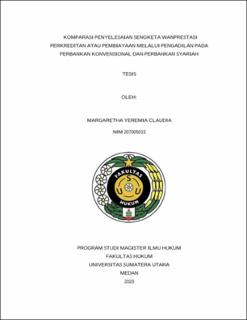| dc.description.abstract | The implementation of banking activities often encounters default problems between debtors and creditors, resulting in disputes between customers and banks, which if not resolved properly by the bank, may potentially harm either the customers or the bank The problems discussed in this study are how the court's authority in resolving default disputes in Islamic and conventional banking, the comparison of the provisions for the application of compensation in resolving default disputes in Islamic and conventional banking, and the comparison of the resolution of default disputes through courts regarding the application of compensation in Islamic and conventional banking. The research method in this study is normative research with an approach to legal research, a case approach, and a comparative approach. Types of legal materials consist of primary legal materials, secondary legal materials, and tertiary legal materials. The data collection technique in this study is a literature study. Based on the research results obtained, it can be concluded that the absolute competence of religious courts is based on Law Number 50 of 2009 concerning Religious Courts, and the absolute competence of general courts is based on Law Number 49 of 2009 concerning General Courts. Compensation in Islamic banking refers to Punta DSN-MUI No.43/DSN MUI/VIII/2004 Regarding Compensation (ta wid), whereas in the context of conventional banking according to the provisions of Article 1243 of the Civil Code. Conventional banks operate strictly based on statutory provisions and other banking policies. Islamic banks operate based on statutory provisions and the Shark, Supervisory Board. | en_US |


